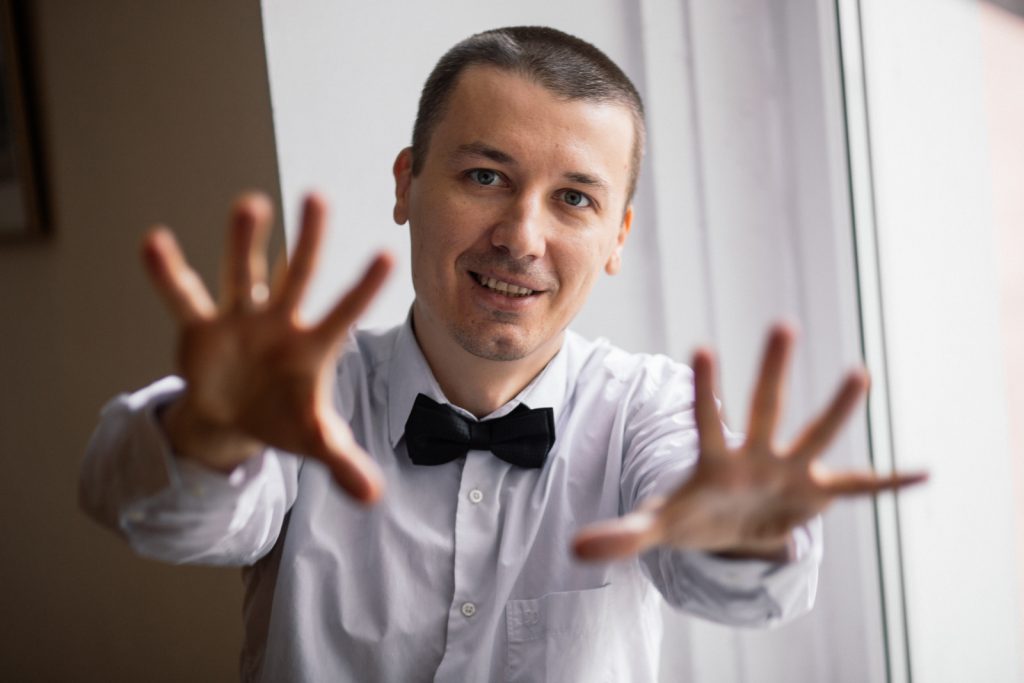
Для детей и взрослых!
Здравствуйте, уважаемые любители классической музыки, поклонники фортепиано!
Меня зовут Владимир Слаква. Я пианист, и практически всю свою сознательную жизнь посвятил этой замечательной профессии. На данном сайте я делюсь своими знаниями и опытом.
Вы можете найти здесь целый клондайк по обучению игре на пианино!
Основным ядром являются видео — курсы по обучению игре на фортепиано. Также, Вы найдёте множество статей — новостей на различные темы, так или иначе связанных с фортепианным исполнительством.
Кто ещё не подписался на мой канал в YouTube, сделайте это прямо сейчас!
Ниже вкратце расскажу о себе.
Заниматься музыкой я начал, когда мне было 5 лет. В детский садик, который меня водили, из музыкальной школы прибыла спец. комиссия по прослушиванию детей. На предмет рекомендаций для дальнейшего обучения музыке.
Я простучал или прохлопал ритм, этого, честно говоря, особо не помню. За это получил приглашение на вступительный экзамен в музыкалку.
И вот мы с мамой идём по уютной Феодосийской улочке прослушиваться в муз. школу №1. Мне 5 лет, мама останавливает меня и спрашивает: «Вова, скажи мне, ты точно хочешь учиться музыке? А то ведь мы можем развернуться и пойти домой..»
Мои мысли были так же чисты, как и мои чувства. Я поочередно раз 8 повторил про себя «да» и «нет» и, с загадочной улыбкой снаружи и сомнительной в душе, ответил маме «да»…
Меня прослушали. Пел я как медведь, но, в принципе, понимал это. Исполнял песню «Эх бей, винтовка, метко – ловко», которую мы пели с моим дедушкой, гуляя под оврагом по лесочку. Потом неплохо повторил ритм, и меня приняли.
К хорошему преподавателю я попал не сразу, а лишь после семи! лет обучения. Как потом выяснилось, преподавательница, у которой я проучился эти семь лет, страдала психическими расстройствами. И я очень надеюсь, что не был тому причиной.
Занятия с ней начинались с того, что я вытягивал вперед свои руки, и Наталья Алексеевна проверяла их чистоту. В особенности ногтей. Если её что – либо не устраивало, она отправляла меня в уборную и вычитывала мою маму, которая приводила меня в муз. школу до 7-8 летнего возраста.
Не могу сказать, что у меня сохранилось много воспоминаний об этом периоде. Помню, как я со страхом приходил на урок, всегда должным образом не подготовленный. Садился играть, и у меня ничего не выходило.
Тогда за пианино садилась показывать сама Наталья Алексеевна. Обязательным условием во время её игры было то, что я должен был всегда смотреть на её руки.
Почти на каждом уроке, Наталья Алексеевна рассказывала мне и моей маме про гениального Лёву Рябинина, который занимается по 5 — 6 часов в день, и которому нет равных в муз. школе.
По дороге домой, мы с мамой обсуждали Лёву и пытались высчитать, возможны ли такие ежедневные занятия. С учётом посещения общеобразовательной школы и всевозможных повседневных событий.
Никаких особых достижений за эти семь лет к меня не было. Пару раз я участвовал в конкурсах, которые проводились внутри музыкальной школы. Один раз, даже играл своё собственное сочинение. Но результат был не ахти.
Что происходило со мной перед выходом на сцену, во время регулярных зачётов и экзаменов, знают лишь те, кто прошёл музыкальную школу.
Ощущение ужаса какое – то особое, не сравнимое с не выученным уроком в общеобразовательной школе. Там вы можете сдать пустую тетрадь и пойти домой, пообещать выучить стих на след. урок и т. д. В любом случае, можно оперировать словами, языком, на котором мы все учимся говорить с раннего детства.
А тут нужно рассказывать нотами, пальцами! А что делать, если вас не научили? Ведь вышел на сцену – играй!
От начала до конца! И как угодно, это никого не волнует..!
Не буду утомлять Вас этими давно забытыми страстями, польза от описания которых сейчас может быть лишь в том, чтобы сгладить сожаление многих взрослых людей, что они в детстве не посещали музыкальную школу и не научились играть «вовремя».
Итак, когда мне было 12 лет, наступил поворотный момент в моих занятиях музыкой. Да и в принципе в моей жизни. А связан он был, конечно же, с переходом к другому педагогу.
Мама неоднократно приходила заплаканная на работу, после не радостных разговоров с Натальей Алексеевной, и сотрудницы уговорили её решиться на этот шаг. За что я им лично премного благодарен.
Галина Федоровна Веселова, музыкант от Бога, открыла мне абсолютно неизвестный ранее, богатый музыкальными образами и настроениями, неимоверно красочный мир музыки.
Началась длительная активная и, временами, очень непростая работа. Результатом которой стали победы на многих конкурсах. Поездки, выступления на различных концертах, в частности с оркестром, и, наконец, принятие решения посвятить свою жизнь искусству.
Далее последовали три года обучения в харьковской десятилетке ( ХССМШ — и ) у зав. фортепианным отделением С. И. Захаровой. Учась у Светланы Игоревны, я впервые стал лауреатом уже Международных конкурсов: памяти Сергея Прокофьева и IBLA GRAND PRIZE в Италии.
Затем я поступил в НМАУ им. П. И. Чайковского ( киевская консерватория ) к потрясающему музыканту, педагогу и исполнителю, проф. В. О. Козлову.
На 4 курсе, параллельно с консерваторией, я учился в Мексике у выдающегося современного пианиста, преподавателя, композитора и дирижера Анатолия Борисовича Затина.
После консерватории, я закончил и аспирантура в НМАУ им. П. И. Чайковского. Это дало мне право преподавать в этом же заведении. Что я и делал последующие два года после аспирантуры.
Не буду сейчас описывать здесь весь свой тернистый путь. Каждый из нас проходит свой. Скажу лишь, что своим истинным призванием считаю преподавательскую деятельность.
А потому, приглашаю в свой онлайн — класс людей, по – настоящему любящих музыку и искусство. Желающих освоить потрясающий инструмент фортепиано. Таящий в себе так много загадок.
Людей, готовых отдавать время и силы ради достижения ценностей неосязаемых. В любом случае, людей, идущих по пути самосовершенствования.
Занятия фортепиано онлайн
Посмотреть цены видео — курсов
Читать статьи и новости PianoArt
Подписаться на мой ютуб — канал
Приобрести все видео — курсы со скидкой 50%
C уважением
Владимир Слаква:
slakva1983@gmail.com
Viber, WhatsUp, Telegram: +460737820497

